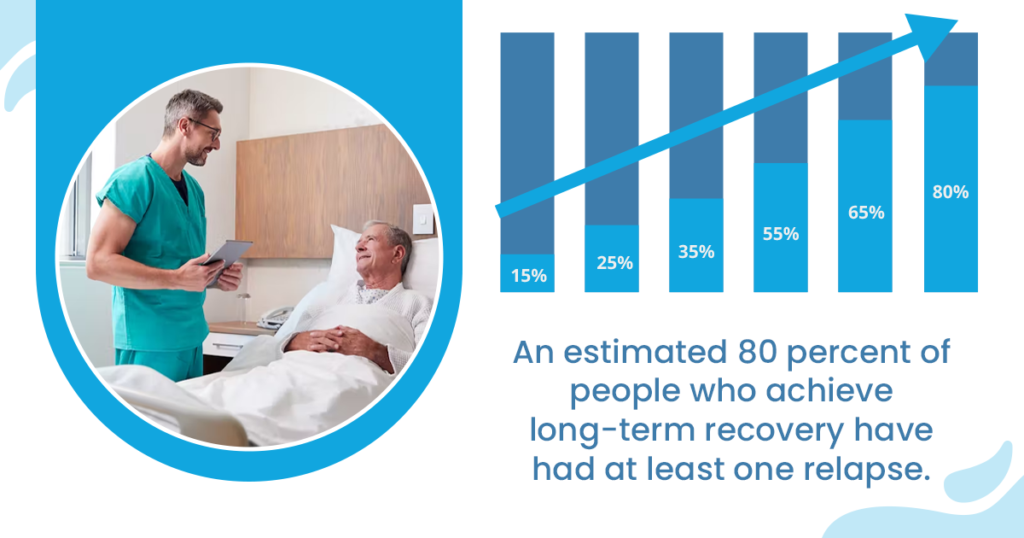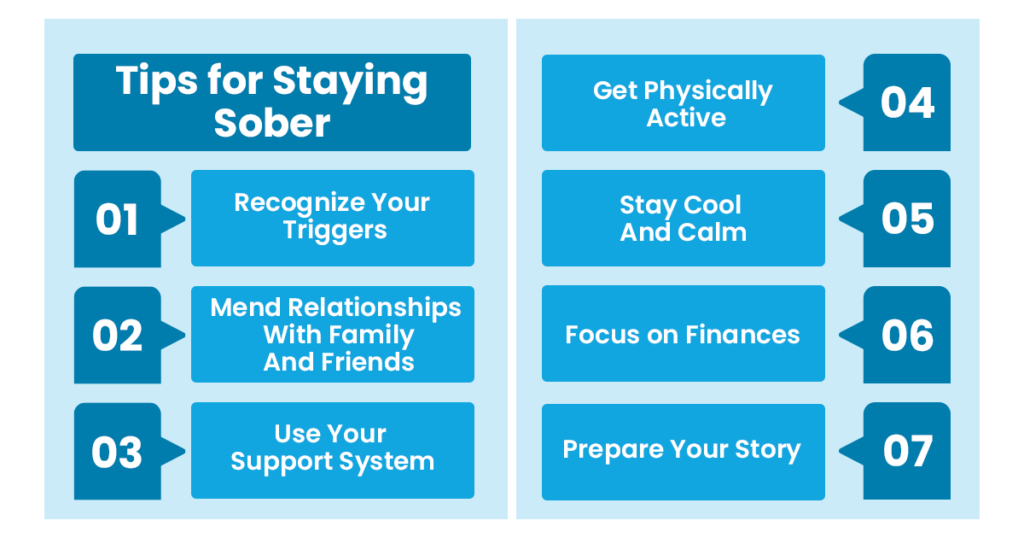Even with the support of family members and friends, staying sober is never simple. Recovery from alcohol or drug addiction is a lifetime journey with several challenges. At times, it may seem impossible to ride out the tough times, especially at major events such as the holidays or a friend’s birthday.
An estimated 80 percent of people who achieve long-term recovery have had at least one relapse. Many people experience several relapses before finding lasting recovery. Your intentions may be good, but avoiding a relapse takes more than willpower.
A relapse can sneak up on a person, typically because they fail to identify the signs of an impending relapse. Relapse occurs long before the individual picks up a drug or a drink. Fortunately, there are strategies you may implement to assist you in managing your sobriety.
Whether you are an addict or you want to improve your physical and mental health, here are a few tips that can help you stay and live a sober life.

Recognize Your Triggers
Whether your triggers are internal, such as tension, frustration, fear, anxiety, or sadness, or external, such as specific people or places, stay mindful. Emotionally assess yourself and prioritize your self-care.
Mend Your Relationships With Family And Friends
The importance of family engagement in substance abuse treatment cannot be overstated. Family relationships may sometimes play a role in your alcohol or drug abuse. In other cases, family members participating in your recovery path can prevent you from relapsing.
Mending these relationships require family therapy. A therapy environment might help you feel more comfortable bringing up topics that you would not ordinarily discuss. Your family can encourage you to maintain sobriety if you work through your concerns.
Friends can play a significant role in your recovery as well. However, if you have few friends you don’t feel comfortable trusting, it may be better to find support groups to join. Not only may they help you learn more about how to avoid relapse, but you can also make new friends dealing with the same issues.
Use Your Support System
Your family members, friends, and fellow peers all want you to overcome difficulties and be clean, safe, and sober, so allow them to assist you. Maintain contact with them over the phone, via video chat, or in person. Make a list of ten people, including your sponsor, that you may call; carry this list with you at all times, and try to speak with at least one person daily.
Get Physically Active
If you drank heavily and were dependent on drugs for an extended period of time, there is a strong possibility that your health was negatively affected.
Physical activity and recreational activities help alleviate stress, which is a primary relapse trigger. Primarily, physical activity may restore a feeling of equilibrium in your life, resulting in emotional benefits.
Better nutrition and exercise will enhance your overall health, make you feel better, and lessen any post-acute withdrawal symptoms you may have.
Find Ways To Deal If You Get Thrown Off Your Schedule
Routines are crucial for addiction treatment because a chaotic or unorganized life may tempt you to relapse into old patterns.
Establishing a routine that works for you and researching coping mechanisms in case your plans change is critical.
Reaching out to your family, attending an Alcoholic Anonymous (AA) meeting, or increasing your meditation routine can help you manage if you are behind schedule due to the holidays or a job loss.
Stay Cool And Calm
It is no secret that many alcoholics and addicts struggle with anger management. Anger is natural, but many individuals with substance abuse problems struggle to manage their anger.
To remain sober, you must learn how to control your anger. There is no question that fury will arrive. How you cope with it will determine how well you sustain your recovery.
Many alcoholics and addicts never learn what is and is not a healthy approach to handling anger. Learn how to cope with your anger in a way that won’t result in you injuring yourself or others and, most importantly, won’t lead you to drink or use drugs.
Focus on Finances
People in recovery from a substance use disorder usually struggle to fulfill work-related responsibilities, keep employment, and manage their finances. If you engaged in your addiction for an extended time, you might have had money issues.
Financial problems and trouble finding and maintaining a job are important relapse triggers, although taking baby steps toward financial stability is possible. Keep in mind that your progress will not occur overnight.
Prepare Your Story
Pre-plan your response if asked why you’re sober. You can try to avoid the topic, but you should have an answer prepared just in case. If the question is posed by a person you know well, you can explain that drugs or alcohol have become problematic for you; therefore, you’re avoiding them. If you do not know the individual well, simply stating that you must get up early the next day or that you stopped due to health concerns would be enough.
Celebrate Milestones
If you are participating in a 12-step program, you probably already understand the importance of milestones. In these programs, it is customary to get plastic chips as you progress to the one-year mark, after which a bronze coin is awarded.
Recognizing and appreciating the hard work of recovery is beneficial for maintaining motivation and reminding you why you took the courageous step toward sobriety. Just make sure that your awards do not involve alcohol or illegal substances. Instead, focus on things, events, and activities that complement your new healthy lifestyle.

Frequently Asked Questions (FAQs)
How do you try to stay sober?
Here are a few tips you can follow to stay sober:
Recognize signs of relapse
Practice healthy living
Create healthy friendships
Build a robust support network
Clean up your finances
Stay physically active
Get some structure in your life
Stay calm
Identify your triggers
Have new habits
Is it easy to stay sober?
Maintaining sobriety is not that simple for most people. The more strategies you learn to recognize triggers, deal with stress, and manage your new sober life, the simpler it will be to avoid relapse.
How long does it take to be completely sober?
An average liver can metabolize around 1 unit of alcohol each hour. This indicates that consuming 12 units of alcohol will take you around 12 hours to sober up—people who begin drinking never do it with the intent to become alcoholics.
How do I motivate myself to get sober?
Here are a few tips that you can follow to motivate yourself to get sober:
Attend 12-step meetings
Consider the costs of drug use
Read inspirational quotes daily
Think about the health risks associated with alcohol and drug use
Seek religion or spirituality
The Haven Is Here To Help You Stay Sober
Recovering from an addiction to drugs and alcohol can be challenging. Receiving treatment from a credited treatment facility like The Haven can result in a successful long-term recovery.
Our proven medical detox methods and effective behavioral therapies have helped hundreds of patients safely and comfortably overcome their addiction. We offer residential treatment as well as flexible outpatient programs to best meet the needs of each patient.
If you or someone you care about is experiencing mental health issues and/or addiction, getting professional help from the best treatment facility, like The Haven, is essential. We have a team of medical professionals willing to help you stay sober.
For additional information, contact us at (561) 328-8627 today!






